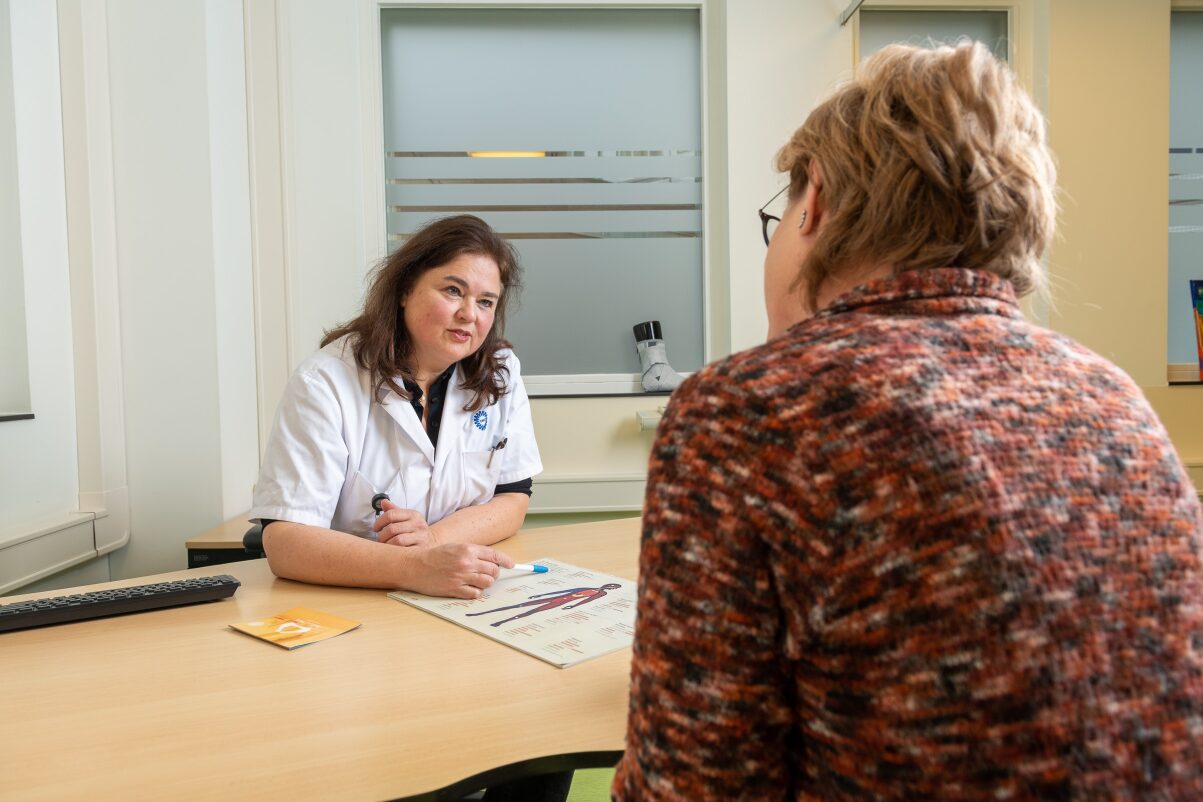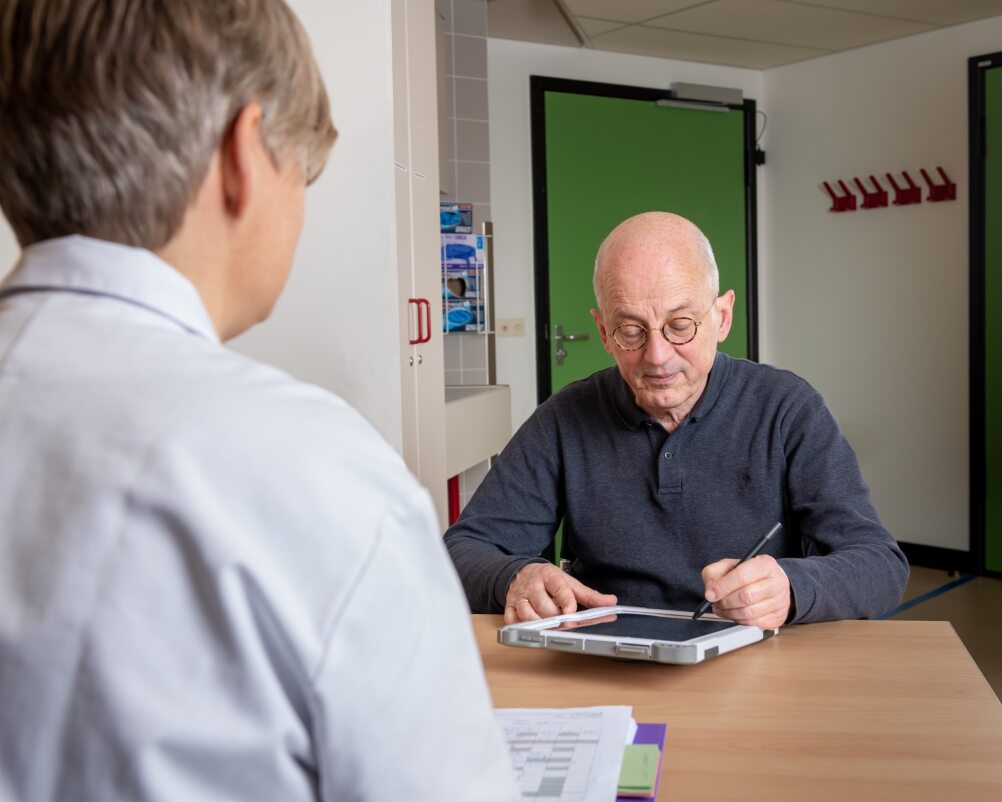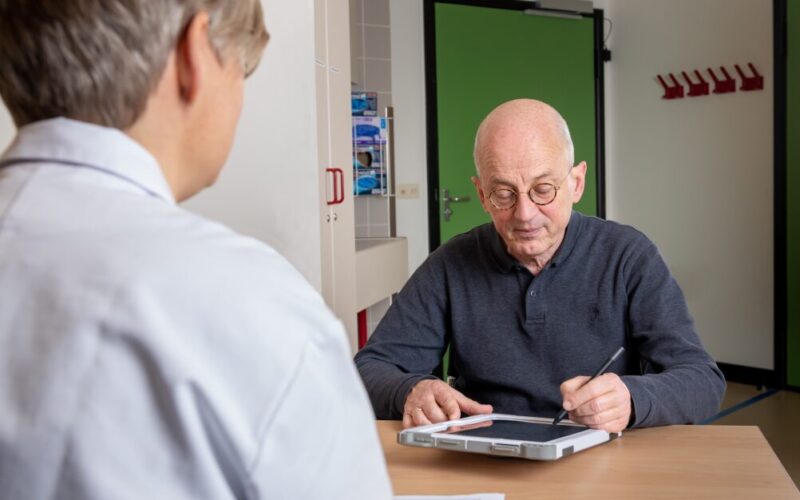“We’re not there yet, but we’re getting closer and closer.” People with ALS are receiving more and more personalized care, and the first treatments are on the horizon. The ALS Center at UMC Utrecht is a hotbed of innovation. Here, four leading researchers bring together genetic research, drug studies, laboratory models and care research in the fight against this deadly muscle disease. In this part, read how rehabilitation physician Esther Kruitwagen aims to enhance the quality of life for ALS patients.
In the Netherlands, a total of 35 treatment teams serve about 1,500 ALS patients. Together they form the national ALS care network, which UMC Utrecht coordinates. UMC Utrecht also has its own treatment team led by rehabilitation physician Esther Kruitwagen. The Utrecht team does extensive research to improve the quality of life of ALS patients.

Esther Kruitwagen in conversation with a patient
Esther Kruitwagen is a rehabilitation physician at UMC Utrecht and works at the ALS Center Netherlands. With her treatment team as well as her research, she is actively committed to improving care for people with ALS so that patients have the best possible quality of life.
Esther explains, “We are very innovative. The goal of the ALS Center is to provide the best care throughout the Netherlands. To do this, we are constantly making plans and trying new things. We do that first in our own treatment team.”
Personalized and efficient care with the home measurement app
An example of such innovation is the Home Measurement and Coaching app. Daily, people with ALS track in the app how they feel, what their weight is, how well their body moves and what actions they can perform. Treatment teams see in real-time how the patient is doing.
Through the app, patients can ask questions directly to their care coach. Esther explains: “The care coach is a nurse specialist specially trained for this role. Contact with the patient via the app goes much further than what we offer in a standard direction center. The care coach asks questions and really tries to empathize with how the patient is feeling.”
Based on the data from the app and the contact with the patient, the care coach can have the patient come for a checkup, or involve other practitioners. This is a big difference from the past. Back then, people with ALS came for checkups every 3 months by default, whether they had symptoms or not. “For people with ALS it is often very difficult to travel to the hospital,” says Esther. “Then it’s nice if they only have to come for checkups when there is a direct reason to do so.”

“You would think that with such an app we are more remote, but the opposite is true,” Esther states. “We are closer than ever. This app provides better monitoring of our patients and provides personalized care. It makes us focused on what care is really needed and how to organize it in the most optimal way. But it’s not just about efficiency. It’s about a respectful approach to the patient, looking at their actual functioning. Patients appreciate this enormously. Some even continue to use the app daily until 2 weeks before their death.”
Supporting children whose parent has ALS
Another example of innovation in the care provided by Esther’s team is the ALS Parents & Kids project. Esther explains: “We investigated the impact on children if one of the parents has ALS. Based on this, we have developed two types of information material. Part of it is intended for parents. They are given tools for conversations with their children about this difficult diagnosis, and for daily situations in the course of the disease. The other part is for the children themselves, so that they can talk about this with friends, teachers, and other people.”
This type of research is called “care research”; it is aimed at improving care. Esther continues: “Initially, we looked at what factors cause a child whose parent has ALS to feel better, be less anxious and have fewer problems later on. Then we took surveys of parents with ALS and their children, and held discussions with the patient association. Based on all these results, we created informational materials for different levels. For younger children there is a comic book, for teenagers there are YouTube videos and interviews.”
Future-proof care for people with ALS
When ALS becomes a treatable disease in the future, more and more people with ALS will live longer with the disease. This means that more people will need ALS care. This will affect how that care is arranged in the Netherlands.
Esther: “We need to examine even more carefully what is needed, what real meaningful care means. This is a complex issue. It is not only about providing the right care, but also about anticipating future changes. How will new treatments affect the patient population? How can we find efficient solutions? These questions are before us now so that we can continue to provide the best possible care to everyone with ALS nationwide.”
